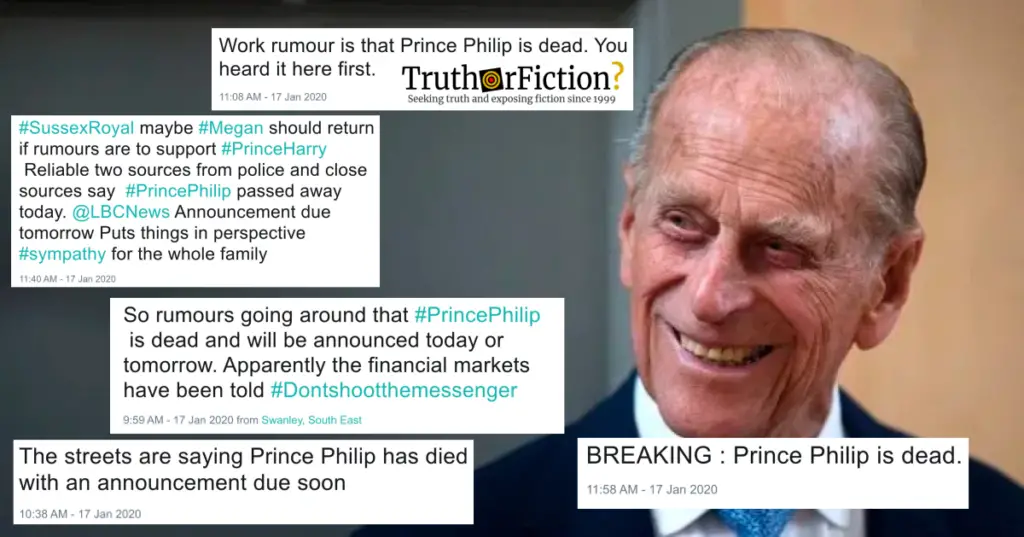On January 17 2020, rumors Queen Elizabeth II’s husband Prince Philip had died began sweeping Twitter. Commonly, users reported hearing the rumor of Philip’s purported death at work or “on the street”:
At least one user referenced a possible origin for the rumor, “the financial markets”:
A common theme to the tweet’s claiming that Prince Philip (who as of January 2020 is 98 years old) had died involved delayed public notification; some said the public would learn “soon” of the monarch’s purported demise, while others alluded to an upcoming announcement around January 18 2020.
The claims of delayed notification reminded us of a popular, longform piece by The Guardian on March 17 2017 about the complex procedure surrounding the eventual death of the United Kingdom’s longest-reigning monarch, Queen Elizabeth II. The story was headlined “‘London Bridge is down’: the secret plan for the days after the Queen’s death,” and the article began as follows:
In the plans that exist for the death of the Queen — and there are many versions, held by Buckingham Palace, the government and the BBC — most envisage that she will die after a short illness. Her family and doctors will be there. When the Queen Mother passed away on the afternoon of Easter Saturday, in 2002, at the Royal Lodge in Windsor, she had time to telephone friends to say goodbye, and to give away some of her horses. In these last hours, the Queen’s senior doctor, a gastroenterologist named Professor Huw Thomas, will be in charge. He will look after his patient, control access to her room and consider what information should be made public. The bond between sovereign and subjects is a strange and mostly unknowable thing. A nation’s life becomes a person’s, and then the string must break.
[…]
Her eyes will be closed and Charles will be king. His siblings will kiss his hands. The first official to deal with the news will be Sir Christopher Geidt, the Queen’s private secretary, a former diplomat who was given a second knighthood in 2014, in part for planning her succession.
An early passage in the piece was reminiscent of the January 2020 rumors about Prince Philip’s death, explaining that the public would not know for some time:
For a time, she will be gone without our knowing it. The information will travel like the compressional wave ahead of an earthquake, detectable only by special equipment. Governors general, ambassadors and prime ministers will learn first. Cupboards will be opened in search of black armbands, three-and-a-quarter inches wide, to be worn on the left arm.
However, the author mused that British subjects would find out sooner than those in the past, predicting rumors on Twitter would spread before any official word:
Screens will glow. There will be tweets. At the BBC, the “radio alert transmission system” (Rats), will be activated — a cold war-era alarm designed to withstand an attack on the nation’s infrastructure. Rats, which is also sometimes referred to as “royal about to snuff it”, is a near mythical part of the intricate architecture of ritual and rehearsals for the death of major royal personalities that the BBC has maintained since the 1930s. Most staff have only ever seen it work in tests; many have never seen it work at all. “Whenever there is a strange noise in the newsroom, someone always asks, ‘Is that the Rats?’ Because we don’t know what it sounds like,” one regional reporter told me.
As of early on January 17 2020, rumors Prince Philip died remained just that — rumors. Although it was possible information of that type had leaked, it was just as possible one inaccurate source was behind all iterations of the rumor — one which appeared to be spreading both on and off social media in the United Kingdom.
We will update this page when we find out more.
Update, January 17 2020, 5:27 PM: In the hours after the rumor of Prince Philip’s death began circulating, Twitter and social media users speculated that a temporary restriction of airspace over Heathrow airport attributed to unplanned Royal Air Force (RAF) activity was related:
An unexplained “security incident” and Royal Air Force operation closed airspace around Heathrow on Friday [January 17 2020] morning, with dozens of arriving planes forced to stack for an hour or divert to other airports due to lack of fuel.
A military flight from nearby RAF Northolt stopped scheduled passenger planes landing at Heathrow, Britain’s busiest airport, for about 20 minutes from 9am.
Earlier news reports of the RAF-related restriction fueled the spreading claims:
One user claimed their sibling worked at Heathrow and shared the rumor with them:
Others claimed the press reporting about RAF activity at Heathrow was atypically vague:
A UK news outlet reported official confirmation a flight had been coordinated through the airspace on the morning of January 17 2020:
A Ministry of Defence spokesman confirmed it had coordinated a flight through the airspace.
He said: “The RAF can confirm that a flight was completed [on January 17 2020] by one of our assets from RAF Northolt, this flight was coordinated with Heathrow ATC but had to extend by a few minutes to complete its sortie. The minor delays caused to civilian air traffic are regretted.”
One person on a Heathrow bound flight said their “flight was circling for ages and crew saying something about security incident over Heathrow airspace.”
Another said their pilot told them the airport was “closed for arrivals for a ‘security incident'”.
No additional information substantiating rumors of Prince Philip’s death emerged in the initial hours after the claims began circulating. Numerous users asserted an announcement was expected for 8 AM on January 18 2020, again an assertion that was unconfirmed.

